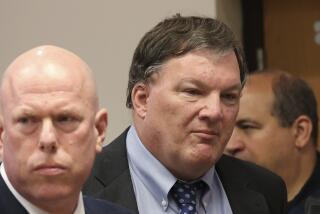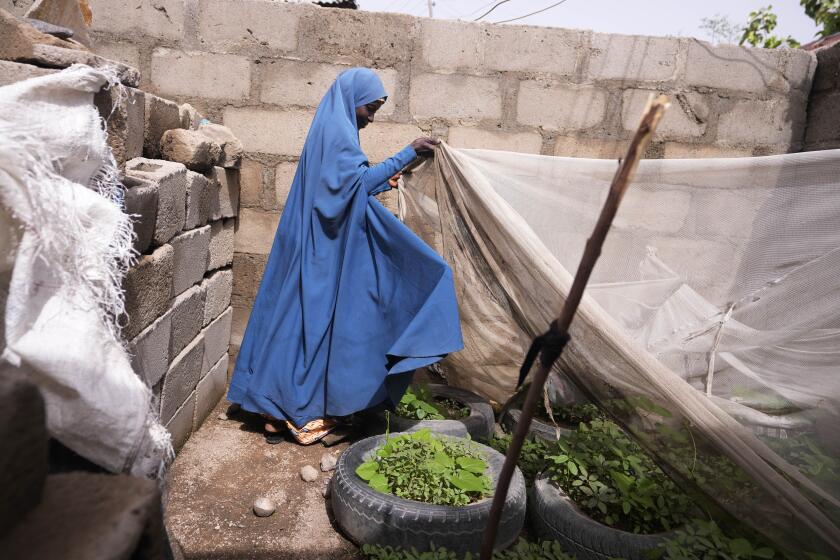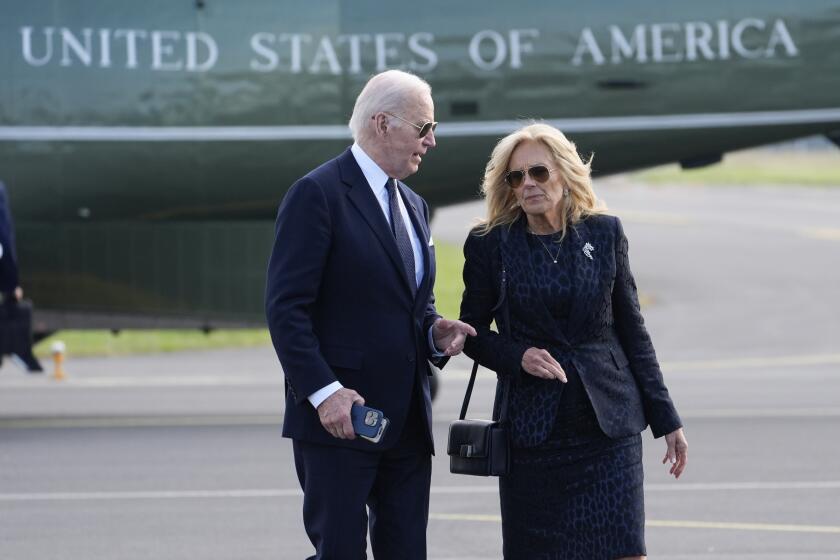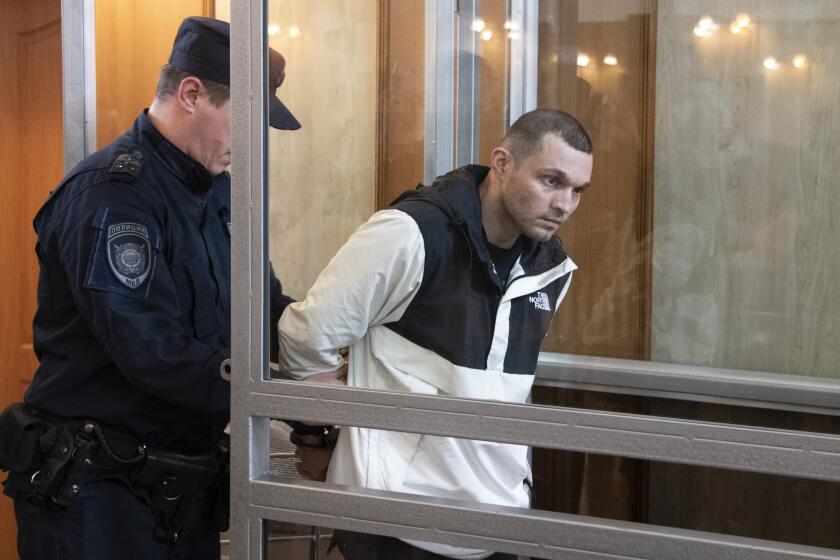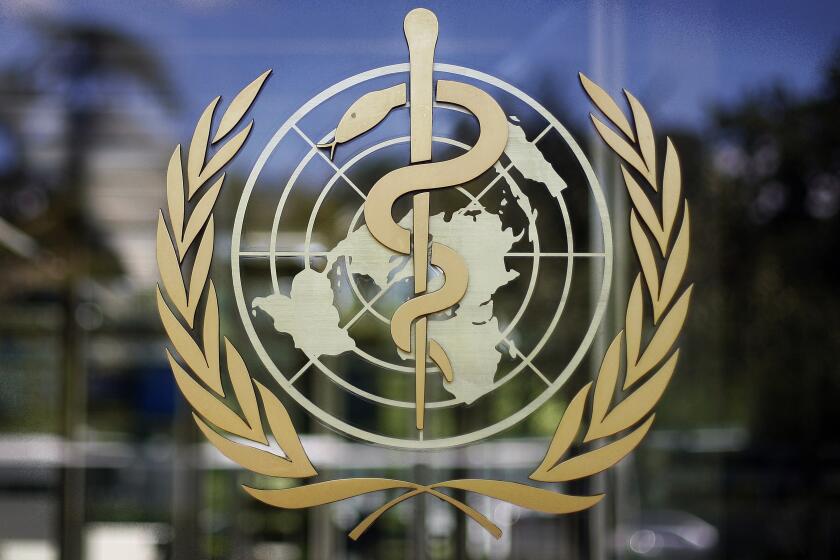Canadians, Iraq Don’t Sway the U.S.
Iraq has offered its first signs of “substantive cooperation” by turning up two bombs, one possibly filled with a biological agent, inspections chief Hans Blix said Tuesday as Canada offered a compromise proposal designed to bridge the gap between the United States and France.
But U.S. officials said that neither cooperation nor compromise offered enough to persuade them to change their plan to ask the Security Council for a mid-March vote to disarm Iraq by force. They said they will continue intensive diplomatic efforts to win badly needed support.
Blix said Tuesday that he has received eight letters from Iraq in the last several days with information on past weapons programs, including the recent discovery of two R-400 aerial bombs at a site where Iraq had disposed of biological weapons before. One of them is filled with “a liquid that appears to be biological,” he said, adding that it would be tested soon.
After denying in 1991 that it had a biological weapons program, Iraq admitted in 1995 that it had produced 155 R-400 bombs that were filled with anthrax, aflotoxin and botulinum toxin. It said that the bombs were buried during the 1991 Persian Gulf War and later destroyed and that most of the related documents were destroyed with them.
But in a letter delivered to Blix over the weekend, Iraqi authorities said they recently discovered handwritten documents about the disposal of prohibited items in 1991.
“There are pieces of evidence that are coming forward, but we still have to see this evidence,” Blix said. He added that he regarded the disclosures as “positive” steps by Iraq, which he said had previously offered only help with the inspections process, not substance.
“This is cooperation on substance,” he told The Times. “Substance is if you find weapons, you can destroy it; if you find documents, it may constitute evidence. That’s not process.”
Iraq has yet to agree to begin destroying by Saturday dozens of Al-Samoud 2 missiles whose range experts found to exceed a U.N.-mandated 93-mile limit. CBS News said Iraqi President Saddam Hussein hinted in an interview with anchor Dan Rather that he would not dispose of the missiles, but Iraqi leaders said Tuesday that the question was unresolved. Iraq maintains that the missiles would not travel beyond the limit when weighed down with a payload, fuel and a guidance system, and asked for more technical talks. But Blix said the matter was not open for negotiation.
“We told them what they need to do,” he said. Blix will include the letters in a written report to the council due by Saturday and answer ambassadors’ questions in a special meeting March 7.
U.S. officials say the report may be Blix’s last before they ask the council to decide that Iraq is not serious about disarming and to authorize military action. The White House rejected Iraq’s sudden weapons revelations as too little, too late.
“I suspect we’ll see him playing games. The world will say, ‘Disarm,’ and he will all of a sudden find a weapon that he claimed he didn’t have,” President Bush told reporters after meeting with the National Economic Council.
But the Security Council remains deeply divided over whether inspectors have had an adequate chance to rid Iraq of nuclear, biological and chemical weapons, along with any bombs and missiles to deliver them.
Canada, although not a member of the council, has suggested that Iraq be required to answer unresolved questions about its weapons programs by March 28. If Iraq did not fully comply with inspectors by then, the council would authorize “all necessary means” to disarm the country by the end of the month. The deadline would be close enough to keep pressure on Iraq to disarm, a Canadian position paper says, but would allow sufficient time for judging whether Iraq was offering substantial evidence that it has disarmed.
The proposal splits the difference between the two choices now facing the council: to declare within three weeks that Iraq has squandered its final chance to disarm voluntarily, as the U.S., Britain and Spain proposed Monday, or to strengthen and extend inspections for at least four months, as France and Germany suggest.
The compromise proposal has caught the interest of many of the 10 rotating council members, which are seeking a solution to the standoff among the five permanent members: the United States, Britain, France, Russia and China. French Ambassador Jean-Marc de la Sabliere met with the 10 on Tuesday to push the French-German proposal. Today, it is the U.S. and Spain’s turn to lobby them. The resolution needs at least nine votes -- and no vetoes from the permanent members -- to pass, and some of the 10 have been threatening to abstain in a bloc until the council can reach a consensus.
“We have to test the middle ground,” said a representative of one of the nonpermanent council members, which favors the Canadian proposal. “It’s an interesting idea. It’s incomplete, but it’s a beginning.”
But the U.S. is distinctly cool to the Canadian idea, and British diplomats called it a “nonstarter” Tuesday. They were even more dismissive of the French-German proposal.
British Prime Minister Tony Blair told the House of Commons Tuesday that it would be “absurd” to give Baghdad more time to disarm unless it offered complete cooperation. And Bush urged the United Nations to “honor its word” and support tough action against Iraq. In the face of stiff opposition, Bush also said again Tuesday that a new resolution would be “helpful and useful” but that the United States does not believe one is necessary for it to act.
But U.S. officials say the administration has not yet made a decision about whether it would pull back its proposed resolution if one of the three veto-wielding members of the Security Council likely to exercise that right -- France, Russia or China -- decided in the end to block passage. The decision on whether to let the process face a veto will be left largely to Blair, who badly needs the cover of a new U.N. resolution because British public opinion is so intensely opposed to the use of force.
In a pitch to win backing for both a new resolution and U.S. intervention in Iraq, Bush will use a speech tonight at the American Enterprise Institute in Washington to reassure both allies and the Arab world of the long-term U.S. commitment in the region, U.S. officials said Tuesday. To Iraqis, Bush is expected to stress that the United States intends to return power to Iraq as soon as possible and in the meantime ensure that humanitarian concerns are addressed.
“He’ll say Iraq belongs to the Iraqis, not outsiders,” said a European envoy briefed on the speech.
Bush is also expected to pledge renewed U.S. commitment, now that a new Israeli government is in place, to generating movement on the Mideast peace process “road map.”
The speech will address a range of listeners, from Blair, who has been under pressure to get the United States to act on the Palestinian-Israeli conflict, to the Muslim world. Pakistan, one of the rotating Security Council members, wants the United States to address Islamic concerns in its plans for Iraq. The U.S. and Britain have been dispatching envoys to council members’ countries to press their case that the U.S. will move to disarm Iraq with or without the U.N. and that it would be better for the council’s integrity if it was united behind the effort.
Most of the uncommitted ambassadors say that there have been no threats or incentives at this early stage in the negotiations and that their votes could not be bought anyway.
“Don’t think because we’re from African countries or underdeveloped countries that we will accept everything,” said Guinean Ambassador Mamady Traore. “We have our dignity.”
*
Farley reported from the U.N. and Wright from Washington. Times staff writers Edwin Chen and John Hendren in Washington, David Holley in Moscow, Janet Stobart in London and John Daniszewski in Baghdad contributed to this report.
More to Read
More to Read
More to Read
Start your day right
Sign up for Essential California for news, features and recommendations from the L.A. Times and beyond in your inbox six days a week.
You may occasionally receive promotional content from the Los Angeles Times.


